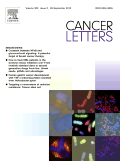
CANCER LETTERS
Scope & Guideline
Transforming discoveries into therapeutic realities.
Introduction
Aims and Scopes
- Molecular Mechanisms of Cancer:
Research articles often explore the molecular and cellular mechanisms underlying cancer development and progression, including genetic, epigenetic, and metabolic alterations. - Therapeutic Strategies:
The journal publishes studies on novel therapeutic approaches, including targeted therapies, immunotherapies, and combination treatments aimed at improving patient outcomes. - Tumor Microenvironment:
A significant focus is placed on the interactions between cancer cells and their microenvironment, including the roles of stromal cells, immune cells, and extracellular vesicles. - Clinical Research and Trials:
Cancer Letters includes articles detailing clinical trials and studies that aim to translate laboratory findings into effective treatments for cancer patients. - Emerging Technologies:
The journal highlights the use of advanced technologies, such as single-cell sequencing and CRISPR, to investigate cancer biology and develop new therapeutic strategies.
Trending and Emerging
- Immunotherapy and Immune Checkpoint Inhibition:
A significant increase in publications focusing on immunotherapy, particularly immune checkpoint inhibitors, reflects the growing importance of harnessing the immune system to combat cancer. - Targeted Therapies and Precision Medicine:
Research on targeted therapies that consider individual patient genetic profiles is trending, showcasing a movement towards personalized cancer treatment. - Metabolism and Cancer:
The exploration of metabolic pathways in cancer cells and their influence on tumor progression and treatment resistance is gaining momentum. - Extracellular Vesicles and Cell-Cell Communication:
There is a rising interest in the role of extracellular vesicles in cancer biology, particularly regarding their role in intercellular communication and tumor microenvironment modulation. - Cancer Stem Cells and Tumor Heterogeneity:
Studies investigating cancer stem cells and tumor heterogeneity are increasingly prominent, emphasizing the complexity of tumor biology and the need for novel therapeutic strategies.
Declining or Waning
- Traditional Chemotherapy Studies:
There has been a noticeable decline in articles solely focused on traditional chemotherapy regimens, as research increasingly shifts towards personalized medicine and targeted therapies. - Basic Epidemiological Studies:
The publication of basic epidemiological studies related to cancer incidence and prevalence has decreased, as more researchers are focusing on molecular and mechanistic insights. - Single Modality Treatment Approaches:
Research that emphasizes single modality treatments (e.g., surgery or radiation alone) is becoming less common, with a growing interest in combination therapies that include immunotherapy and targeted agents. - Static Models of Cancer Research:
There is a reduced emphasis on static models of cancer that do not account for the dynamic nature of tumor biology and the tumor microenvironment. - Generalized Biomarker Studies:
Studies focusing on generalized biomarkers without specific context or mechanistic insights are becoming less frequent, as researchers seek more precise and actionable biomarker identification.
Similar Journals
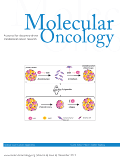
Molecular Oncology
Fostering Excellence in Molecular Oncology Studies.Molecular Oncology, published by WILEY, is a premier open-access journal that has been at the forefront of cancer research since its inception in 2007. With an impressive impact factor reflective of its outstanding contribution to the field, it holds a prestigious position in the Q1 category across multiple disciplines, including Cancer Research, Genetics, and Molecular Medicine. This journal is essential for researchers and professionals seeking to publish high-quality findings in a rapidly evolving area of study, underscored by its significant Scopus rankings that place it within the top percentiles of Oncology and Molecular Biology. As an open-access journal since 2017, it ensures that vital research is readily available to a global audience, thereby facilitating collaboration and knowledge dissemination among academic and clinical communities. With its commitment to innovative and impactful research, Molecular Oncology continues to be a critical resource for advancing our understanding of cancer biology and treatment.
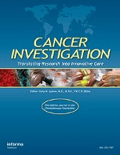
CANCER INVESTIGATION
Unraveling the complexities of cancer through rigorous inquiry.CANCER INVESTIGATION is a distinguished peer-reviewed journal published by Taylor & Francis Inc, dedicated to the advancing field of cancer research and oncology. With an ISSN of 0735-7907 and E-ISSN of 1532-4192, this journal has been a pivotal resource for professionals and researchers since its inception in 1983, continually contributing to the evolving landscape of cancer investigation until its convergence in 2024. CANCER INVESTIGATION boasts noteworthy rankings in 2023, including Q3 in Cancer Research and Q2 in Medicine (miscellaneous), highlighting its relevance and impact in these critical areas. The journal's commitment to disseminating innovative research and comprehensive reviews makes it an essential platform for those engaged in cancer studies and related disciplines. While currently not available as an open-access publication, CANCER INVESTIGATION remains an invaluable tool for understanding the complexities of cancer, offering insights that drive scientific advancements and improve patient outcomes.

Molecular Cancer
Fostering collaboration for groundbreaking cancer research.Molecular Cancer, published by BMC, stands as a premier open access journal dedicated to advancing our understanding of cancer biology, treatment, and prevention since its inception in 2002. With an impressive Q1 ranking in the domains of Cancer Research, Molecular Medicine, and Oncology, this journal occupies a significant position in the academic landscape, emphasizing high-quality research that influences clinical practices and future studies. The journal is indexed in leading databases with exceptional Scopus ranks, reflecting its rigorous peer-review process and impactful contributions to the field, where it ranks in the top 2-3 positions across various relevant categories. Based in the United Kingdom, Molecular Cancer offers researchers worldwide a valuable platform for disseminating innovative findings that drive the biomedical community forward. The journal's open access model ensures that groundbreaking research is freely accessible, fostering collaboration and knowledge sharing among professionals, students, and academics alike. Explore cutting-edge developments in cancer research through Molecular Cancer and join a community committed to improving patient outcomes and advancing scientific discovery.

NEOPLASIA
Connecting minds for a future free of cancer.NEOPLASIA is an esteemed open-access journal dedicated to advancing the field of oncology, published by Elsevier Science Inc. since 1999. With an impressive impact factor and recognition as a Q1 journal in Cancer Research for 2023, it holds a significant position within the scientific community, specifically ranking in the 74th percentile globally in the categories of Biochemistry, Genetics, and Molecular Biology. NEOPLASIA seeks to provide a comprehensive platform for innovative research, covering a wide array of topics in cancer biology, treatment methodologies, and therapeutic advancements. Researchers, professionals, and students are encouraged to utilize this resource, which is easily accessible to foster collaboration and stimulate progress in cancer research. As it converges its efforts towards the future of oncology, this journal is poised to remain at the forefront of transformative discoveries that shape our understanding and treatment of cancer.
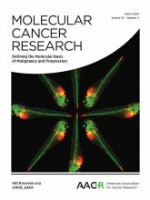
MOLECULAR CANCER RESEARCH
Innovating Cancer Research for Tomorrow's TherapiesMOLECULAR CANCER RESEARCH, published by the American Association for Cancer Research, stands as a pivotal journal in the fields of cancer research, molecular biology, and oncology. With an impressive impact factor and recognized as a Q1 journal in its respective categories for 2023, it serves as an essential resource for researchers, professionals, and students aimed at advancing our understanding of cancer mechanisms and therapies. The journal, identified by the ISSN 1541-7786 and E-ISSN 1557-3125, provides a platform for cutting-edge research and clinical applications, emphasizing innovation and collaboration within the scientific community. With its focus on high-quality, peer-reviewed articles, MOLECULAR CANCER RESEARCH is vital for anyone looking to stay abreast of significant advancements in cancer biology and treatment strategies. For more details and to access the journal's content, please visit the publisher's link.
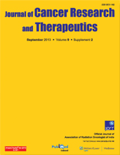
Journal of Cancer Research and Therapeutics
Uniting researchers to combat cancer effectively.The Journal of Cancer Research and Therapeutics is a prominent peer-reviewed platform dedicated to advancing scientific knowledge in the fields of oncology, radiology, and therapeutic interventions. Published by Wolters Kluwer Medknow Publications in India, this journal has been an essential resource for researchers and professionals since its inception in 2005, with a convergence of findings through to 2024. Although classified within the Q3 quartile across multiple relevant categories in the 2023 rankings, the journal maintains a significant impact in the fields of medicine, particularly in oncology and radiology, as evidenced by its Scopus rankings. The journal aims to disseminate high-quality research, case studies, and clinical trials that contribute to understanding and improving cancer treatments and patient care. With its accessibility to a global audience, the Journal of Cancer Research and Therapeutics plays a pivotal role in fostering dialogue and collaboration among researchers and healthcare professionals dedicated to combating cancer.
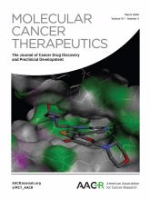
MOLECULAR CANCER THERAPEUTICS
Elevating the standards of cancer therapeutics.MOLECULAR CANCER THERAPEUTICS, published by the American Association for Cancer Research, is a premier journal dedicated to advancing the field of cancer research and therapy since 2001. With a notable impact factor reflecting its high-quality content, this journal stands out in the Q1 category for both Cancer Research and Oncology as of 2023. Researchers, clinicians, and students interested in innovative treatment strategies and molecular mechanisms can find valuable insights within its pages, bolstered by a rigorous peer-review process and a global perspective on cancer therapeutic developments. Although the journal operates under a subscription model, it provides comprehensive access to cutting-edge studies and reviews that drive forward the understanding of cancer biology and treatment modalities. The journal's impressive Scopus rankings further validate its influence within both oncology and the broader cancer research community, making it an indispensable resource for anyone committed to combating cancer through science.

NATURE REVIEWS CANCER
Illuminating the Path to Cancer UnderstandingNATURE REVIEWS CANCER, a premier journal published by NATURE PORTFOLIO, stands as a cornerstone in the field of oncology, focusing on delivering high-quality, comprehensive reviews that shape our understanding of cancer biology, prevention, and treatment. With an impressive impact in the academic community, it ranks Q1 in both Cancer Research and Oncology categories as of 2023, further denoted by a remarkable Scopus ranking as the top journal in Cancer Research and second in Oncology. This ensures that published articles not only set the standard for scientific excellence but also drive significant advancements in cancer research methodologies and practices. The journal's targeted audience, including researchers, practitioners, and students, will greatly benefit from its insightful analyses and interdisciplinary approach. While it operates under a traditional subscription model, the rich content and vast expertise presented in its articles foster a global dialogue on cancer-related issues, making it an essential resource for anyone dedicated to the advancement of cancer science.

Cancer Biomarkers
Exploring Novel Frontiers in Cancer Research.Cancer Biomarkers is a leading journal in the field of cancer research, aimed at the exploration and identification of novel biomarkers for cancer detection, prognosis, and therapy. Published by IOS PRESS in the Netherlands, this journal serves as a pivotal resource for those engaged in oncology, genetics, and molecular biology, facilitating access to cutting-edge research and advancements within these disciplines. In its ongoing mission since 2005, the journal has become an essential reference point, currently occupying a Q3 category in Cancer Research, Genetics, and Oncology, and a Q2 category in miscellaneous Medicine fields. With its commitment to high-quality peer-reviewed articles, Cancer Biomarkers satisfies the intellectual appetite of researchers, clinicians, and students alike, contributing significantly to the ever-evolving landscape of cancer biomarker discovery and application. Though currently not available as Open Access, the journal maintains a robust presence in academic circles, underscored by respectable Scopus rankings across relevant categories.

BIOCHIMICA ET BIOPHYSICA ACTA-REVIEWS ON CANCER
Advancing the Frontiers of Cancer ResearchBIOCHIMICA ET BIOPHYSICA ACTA-REVIEWS ON CANCER, published by Elsevier, has established itself as a leading journal in the domains of cancer research, genetics, and oncology, holding a prestigious position in the Q1 quartile rankings in these fields as of 2023. With an ISSN of 0304-419X and an E-ISSN of 1879-2561, this journal aims to disseminate high-quality, impactful reviews that synthesize the latest advancements and findings in cancer biology, treatment modalities, and genomic studies. Its robust indexing and remarkable Scopus rankings—placing it in the 95th to 91st percentiles across various categories—underline its significance for researchers, clinicians, and students passionate about oncology. Operating from its Netherlands headquarters, BIOCHIMICA ET BIOPHYSICA ACTA-REVIEWS ON CANCER is dedicated to fostering a comprehensive understanding of the complex biological mechanisms underlying cancer, promoting innovative therapeutic strategies, and guiding future research directions.